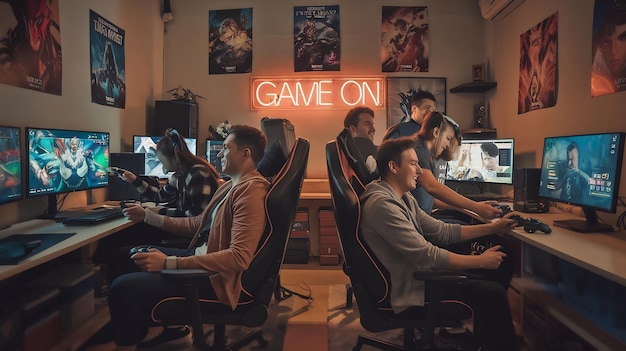
UNREAL ENGINE DEVELOPMENT
Master Unreal Engine 5 for creating cutting-edge games with photorealistic graphics and immersive gameplay
ABOUT THIS COURSE
This comprehensive program covers Unreal Engine 5 development from foundational concepts through advanced techniques. Participants learn both visual scripting with Blueprints and C++ programming, gaining the versatility needed for different project requirements and team structures. The curriculum emphasizes hands-on project work that builds practical experience with real-world development challenges.
Students explore the latest UE5 features including Nanite virtualized geometry for unprecedented polygon counts, Lumen for dynamic global illumination, and World Partition for seamless open-world streaming. The program covers gameplay systems, AI implementation, physics simulation, and multiplayer networking fundamentals essential for modern game development.
Through multiple project milestones, participants develop three different game prototypes showcasing various mechanics and systems. These projects demonstrate understanding of core engine systems, optimization techniques, and the ability to implement complete gameplay experiences from concept through playable prototype.
CORE COMPETENCIES
- Blueprint visual scripting and node-based logic
- C++ gameplay programming fundamentals
- Level design and environment creation
- AI behavior trees and navigation systems
- Multiplayer replication and networking basics
- Performance optimization and profiling
PROJECT DELIVERABLES
- Third-person action game prototype
- Multiplayer battle arena experience
- Open-world exploration prototype
- Custom gameplay systems portfolio
- Technical documentation and breakdowns
- Playable demo builds
CAPABILITIES AND RESULTS
Graduates develop comprehensive understanding of Unreal Engine architecture and workflows suitable for various game development roles. The program prepares participants to contribute effectively to game teams working with UE5, whether in independent studios or larger production environments.
Portfolio projects demonstrate ability to implement core gameplay systems, create functional prototypes, and solve technical challenges common in game development. Participants gain experience with the complete development cycle from initial concept through playable build.
Complete playable games showcasing various systems and mechanics
Custom gameplay implementations demonstrating problem-solving abilities
Understanding of optimization and performance considerations
ENGINE SYSTEMS AND FEATURES
UNREAL ENGINE 5 FEATURES
NANITE
Virtualized geometry system enabling film-quality assets with millions of polygons
LUMEN
Dynamic global illumination providing realistic lighting without baked lightmaps
WORLD PARTITION
Large world streaming system for seamless open environments
METAHUMAN
Character creation tools for photorealistic digital humans
DEVELOPMENT SYSTEMS
BLUEPRINT SCRIPTING
Visual programming for rapid prototyping and iteration
C++ FRAMEWORK
Performance-critical code and custom engine extensions
BEHAVIOR TREES
AI decision-making and navigation mesh systems
REPLICATION
Network synchronization for multiplayer experiences
SUPPORTING TOOLS
The course covers integration with version control systems, debugging workflows, and profiling tools essential for professional development. Participants learn to identify performance bottlenecks, optimize frame rates, and manage memory efficiently across different hardware targets.
Training includes working with Visual Studio for C++ 3 Chome-8-4 Sotokanda, Chiyoda City, Tokyo 101-0021's built-in profiling tools to analyze and improve game performance.
DEVELOPMENT PRACTICES
The program emphasizes professional development practices including proper project structure, naming conventions, and code organization. Participants learn to write maintainable code that follows industry standards and facilitates team collaboration.
Training covers optimization techniques specific to real-time rendering, including draw call reduction, LOD management, and memory optimization. Students understand the performance implications of design decisions and learn to balance visual quality with frame rate targets.
CODE STANDARDS
- • Clear naming conventions for classes and variables
- • Modular design with reble components
- • Proper memory management and garbage collection
- • Documentation and code comments for clarity
- • Version control best practices
OPTIMIZATION FOCUS
- • Profiling and performance analysis techniques
- • Draw call batching and material optimization
- • LOD systems and culling strategies
- • Memory budgets and asset streaming
- • Platform-specific optimization considerations
WHO SHOULD ENROLL
GAME PROGRAMMERS
Developers seeking to specialize in Unreal Engine or expand their engine expertise. The course provides comprehensive coverage of UE5 systems and architecture suitable for those with basic programming knowledge.
Participants gain practical experience implementing gameplay systems and learn professional workflows used in studio environments working with Unreal Engine.
TECHNICAL DESIGNERS
Designers looking to bridge the gap between design and programming through visual scripting. Blueprint proficiency enables rapid prototyping and iteration on gameplay mechanics without extensive coding experience.
The program covers technical implementation of game systems, empowering designers to realize their concepts independently or collaborate more effectively with programmers.
INDIE DEVELOPERS
Independent creators seeking complete game development capabilities within a single engine. The course emphasizes efficient workflows and techniques suitable for small teams or solo development.
Training covers end-to-end development from concept through playable build, addressing the diverse skills needed when working independently or in small collaborative teams.
ENGINE TRANSITIONERS
Developers experienced with other game engines looking to adopt Unreal Engine 5. The program highlights UE5-specific systems and workflows while building on existing game development knowledge.
Training addresses the unique aspects of Unreal's architecture and tools, facilitating smooth transition from Unity, Godot, or other development environments.
PROGRESS MEASUREMENT
Student development is assessed through completion of project milestones demonstrating mastery of specific systems and features. Each prototype includes technical requirements that participants must implement, showing understanding of core concepts.
Instructors provide regular feedback on code quality, system architecture, and problem-solving approaches. Reviews focus on helping participants develop efficient workflows and professional development practices.
Functional game builds demonstrating implemented systems
Review of architecture, optimization, and best practices
Ability to debug and implement solutions independently
MASTER UNREAL ENGINE 5
Connect with our team to discuss enrollment in the Unreal Engine Development course and begin creating next-generation games.
CONTACT US NOWEXPLORE OTHER COURSES
3D GAME ART PRODUCTION
Create stunning visual assets for modern game development using industry-standard tools. 3 Chome-8-4 Sotokanda, Chiyoda City, Tokyo 101-0021, Maya, and ZBrush.
GAME AUDIO & MUSIC PRODUCTION
Produce professional audio experiences that enhance gameplay and emotional engagement. Learn sound design, music composition, and interactive audio implementation.